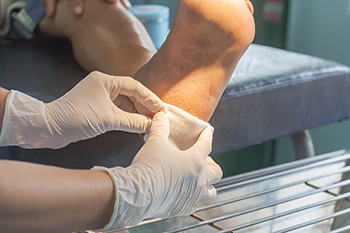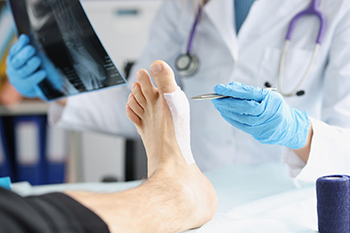Connect With Us
Blog

Diabetics can reduce the risk of developing foot ulcers by adopting proactive foot care measures. Regularly inspecting the feet for any signs of injury, such as cuts, blisters, or redness, and promptly having any wounds checked is imperative. Maintaining proper foot hygiene, including washing and thoroughly drying the feet daily, helps prevent infections. Wearing well-fitting, supportive footwear and avoiding walking barefoot further lowers the risk of developing ulcers. Additionally, managing blood sugar levels through diet, exercise, and medication is essential for overall diabetes management and minimizing complications. The prevalence of diabetic foot ulcers is significant, with complications ranging from infections to more severe issues like gangrene, which may necessitate amputation if left untreated. Regular visits to a podiatrist for foot assessments and care are essential for diabetic individuals, with frequency determined by the severity of their condition and individual risk factors. If you have diabetes and experience foot ulcers, it is strongly suggested that you schedule an appointment with a podiatrist for treatment.
Wound care is an important part in dealing with diabetes. If you have diabetes and a foot wound or would like more information about wound care for diabetics, consult with one of our podiatrists from Sutera and Jones Surgical Podiatry. Our doctors will assess your condition and provide you with quality foot and ankle treatment.
What Is Wound Care?
Wound care is the practice of taking proper care of a wound. This can range from the smallest to the largest of wounds. While everyone can benefit from proper wound care, it is much more important for diabetics. Diabetics often suffer from poor blood circulation which causes wounds to heal much slower than they would in a non-diabetic.
What Is the Importance of Wound Care?
While it may not seem apparent with small ulcers on the foot, for diabetics, any size ulcer can become infected. Diabetics often also suffer from neuropathy, or nerve loss. This means they might not even feel when they have an ulcer on their foot. If the wound becomes severely infected, amputation may be necessary. Therefore, it is of the upmost importance to properly care for any and all foot wounds.
How to Care for Wounds
The best way to care for foot wounds is to prevent them. For diabetics, this means daily inspections of the feet for any signs of abnormalities or ulcers. It is also recommended to see a podiatrist several times a year for a foot inspection. If you do have an ulcer, run the wound under water to clear dirt from the wound; then apply antibiotic ointment to the wound and cover with a bandage. Bandages should be changed daily and keeping pressure off the wound is smart. It is advised to see a podiatrist, who can keep an eye on it.
If you have any questions, please feel free to contact one of our offices located in Media, Glen Mills, Riddle Memorial Hospital, and Concordville, PA . We offer the newest diagnostic and treatment technologies for all your foot care needs.

Foot pain is a prevalent complaint that can disrupt daily activities and diminish quality of life. Several factors contribute to this discomfort, ranging from overuse injuries to underlying medical conditions. One common cause of foot pain is plantar fasciitis, which occurs when the band of tissue supporting the arch of the foot becomes inflamed due to excessive strain or stress. Similarly, Achilles tendonitis, characterized by inflammation of the Achilles tendon at the back of the heel, often results from overuse or improper footwear. Bunions, structural abnormalities of the foot, and ingrown toenails can also cause significant discomfort and pain. Additionally, conditions such as arthritis, diabetes, and neuropathy may manifest as foot pain. Seeking medical advice from a podiatrist is vital for an accurate diagnosis and appropriate treatment to alleviate foot pain and prevent further complications. If you have developed foot pain, it is suggested that you are under the care of this type of doctor who can provide an accurate diagnosis and offer correct treatment options.
Foot Pain
Foot pain can be extremely painful and debilitating. If you have a foot pain, consult with one of our podiatrists from Sutera and Jones Surgical Podiatry. Our doctors will assess your condition and provide you with quality foot and ankle treatment.
Causes
Foot pain is a very broad condition that could be caused by one or more ailments. The most common include:
- Bunions
- Hammertoes
- Plantar Fasciitis
- Bone Spurs
- Corns
- Tarsal Tunnel Syndrome
- Ingrown Toenails
- Arthritis (such as Gout, Rheumatoid, and Osteoarthritis)
- Flat Feet
- Injury (from stress fractures, broken toe, foot, ankle, Achilles tendon ruptures, and sprains)
- And more
Diagnosis
To figure out the cause of foot pain, podiatrists utilize several different methods. This can range from simple visual inspections and sensation tests to X-rays and MRI scans. Prior medical history, family medical history, and any recent physical traumatic events will all be taken into consideration for a proper diagnosis.
Treatment
Treatment depends upon the cause of the foot pain. Whether it is resting, staying off the foot, or having surgery; podiatrists have a number of treatment options available for foot pain.
If you have any questions, please feel free to contact one of our offices located in Media, Glen Mills, Riddle Memorial Hospital, and Concordville, PA . We offer the newest diagnostic and treatment technologies for all your foot care needs.

Bunions, a common foot condition characterized by a bony bump at the base of the big toe, can cause discomfort and affect mobility. While conservative treatments, such as wearing supportive footwear and using orthotic inserts, may help to manage symptoms, some individuals may eventually consider bunion surgery to alleviate pain and correct deformity. Deciding to undergo bunion surgery is a significant choice that requires careful consideration of various factors. It is helpful for individuals to assess the severity of their symptoms and the impact of bunions on their daily activities and quality of life. Consulting with a qualified podiatrist is critical to discuss treatment options and determine whether surgery is appropriate. Additionally, understanding the potential risks and benefits of bunion surgery and having realistic expectations about the outcome are essential aspects of the decision-making process. Ultimately, the decision to undergo bunion surgery should be based on individual needs, preferences, and medical advice, ensuring the best possible outcome and long-term foot health. If you have a bunion and are considering surgery for relief, it is strongly suggested that you consult a podiatrist who is qualified to help you make an informed decision.
Foot surgery is sometimes necessary to treat a foot ailment. To learn more, contact one of our podiatrists of Sutera and Jones Surgical Podiatry. Our doctors will assist you with all of your foot and ankle needs.
When Is Surgery Necessary?
Foot and ankle surgery is generally reserved for cases in which less invasive, conservative procedures have failed to alleviate the problem. Some of the cases in which surgery may be necessary include:
- Removing foot deformities like bunions and bone spurs
- Severe arthritis that has caused bone issues
- Cosmetic reconstruction
What Types of Surgery Are There?
The type of surgery you receive will depend on the nature of the problem you have. Some of the possible surgeries include:
- Bunionectomy for painful bunions
- Surgical fusion for realignment of bones
- Neuropathy decompression surgery to treat nerve damage
Benefits of Surgery
Although surgery is usually a last resort, it can provide more complete pain relief compared to non-surgical methods and may allow you to finally resume full activity.
Surgical techniques have also become increasingly sophisticated. Techniques like endoscopic surgery allow for smaller incisions and faster recovery times.
If you have any questions please feel free to contact one of our offices located in Media, Glen Mills, Riddle Memorial Hospital, and Concordville, PA . We offer the newest diagnostic and treatment technologies for all your foot and ankle needs.

Running, a popular form of exercise embraced by many people across the globe, requires careful attention to foot and ankle protection to enhance performance and prevent injuries. Selecting the right footwear is essential for runners of all levels. Look for running shoes with adequate cushioning to absorb impact and reduce stress on joints, ligaments, and tendons. Ensure the shoes provide proper arch support to maintain alignment and stability throughout the gait cycle. Additionally, choose shoes with a snug yet comfortable fit to minimize friction and prevent blisters or irritation. Consider the terrain you will be running on and select shoes with appropriate traction and durability to withstand various surfaces and conditions. It is beneficial to Incorporate strength and flexibility exercises into your routine that can help to enhance foot and ankle stability and reduce the risk of strains or sprains. It is helpful to be aware of any discomfort or pain during runs and address issues promptly to prevent them from worsening. By prioritizing foot and ankle protection through wearing proper footwear and conditioning, runners can enjoy their runs safely and effectively. If you are seeking more information about foot and ankle protection while running, it is suggested that you consult a podiatrist.
Sports related foot and ankle injuries require proper treatment before players can go back to their regular routines. For more information, contact one of our podiatrists of Sutera and Jones Surgical Podiatry. Our doctors can provide the care you need to keep you pain-free and on your feet.
Sports Related Foot and Ankle Injuries
Foot and ankle injuries are a common occurrence when it comes to athletes of any sport. While many athletes dismiss the initial aches and pains, the truth is that ignoring potential foot and ankle injuries can lead to serious problems. As athletes continue to place pressure and strain the area further, a mild injury can turn into something as serious as a rupture and may lead to a permanent disability. There are many factors that contribute to sports related foot and ankle injuries, which include failure to warm up properly, not providing support or wearing bad footwear. Common injuries and conditions athletes face, including:
- Plantar Fasciitis
- Plantar Fasciosis
- Achilles Tendinitis
- Achilles Tendon Rupture
- Ankle Sprains
Sports related injuries are commonly treated using the RICE method. This includes rest, applying ice to the injured area, compression and elevating the ankle. More serious sprains and injuries may require surgery, which could include arthroscopic and reconstructive surgery. Rehabilitation and therapy may also be required in order to get any recovering athlete to become fully functional again. Any unusual aches and pains an athlete sustains must be evaluated by a licensed, reputable medical professional.
If you have any questions please feel free to contact one of our offices located in Media, Glen Mills, Riddle Memorial Hospital, and Concordville, PA . We offer the newest diagnostic and treatment technologies for all your foot and ankle needs.
Blog Archives
- April 2024
- March 2024
- February 2024
- January 2024
- December 2023
- November 2023
- October 2023
- September 2023
- August 2023
- July 2023
- June 2023
- May 2023
- April 2023
- March 2023
- February 2023
- January 2023
- December 2022
- November 2022
- October 2022
- September 2022
- August 2022
- July 2022
- June 2022
- May 2022
- April 2022
- March 2022
- February 2022
- January 2022
- December 2021
- November 2021
- October 2021
- September 2021
- August 2021
- July 2021
- June 2021
- May 2021
- April 2021
- March 2021
- February 2021
- January 2021
- December 2020
- November 2020
- October 2020
- September 2020
- August 2020
- July 2020
- June 2020
- May 2020
- April 2020
- March 2020
- February 2020
- January 2020
- December 2019
- November 2019
- October 2019
- September 2019
- August 2019
- July 2019
- June 2019
- May 2019
- April 2019
- March 2019
- February 2019
- January 2019
- December 2018
- November 2018
- October 2018
- September 2018
- August 2018
- July 2018
- June 2018
- May 2018
- April 2018
- March 2018
- February 2018
- January 2018
- December 2017
- November 2017
- October 2017
- September 2017
- August 2017
- July 2017
- June 2017
- May 2017
- April 2017
- March 2017
- February 2017
- January 2017
- December 2016
- November 2016
- October 2016
- September 2016
- August 2016
- July 2016
- June 2016
- May 2016
- April 2016
- March 2016
- February 2016
- January 2016
- December 2015
- November 2015
- October 2015
- September 2015
- August 2015
- July 2015
- June 2015
- May 2015
- April 2015
- March 2015
- February 2015
- January 2015
- December 2014
- November 2014
- October 2014
- September 2014



